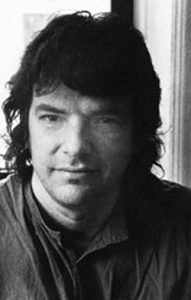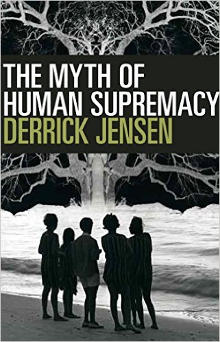With this mind blower of a book, be ready to be humbled. Experience awe. Left feeling sorrow, even anger that might fuel you to action. Activist, philosopher and author Derrick Jensen hopes so.
With fiery style, Jensen keeps his readers close as he doggedly challenges assumptions we have about ourselves and the natural world – beliefs so ingrained we treat them like truths. I immediately resonated with the challenging of deeply-held assumptions. In my book, The Baby Matrix, I challenge pronatalist assumptions society has held about parenthood and reproduction for so long they too feel like truths, whether they are or not.
The Power of Unquestioned Assumptions
Jensen starts with this truth – “Unquestioned assumptions are the real authorities of any culture.” And our culture has this central unquestioned belief: humans are superior to and separate from all else in the natural world. He drills into how and why human supremacy has even gone past existing as an unquestioned belief to being our very identity. What’s the problem with this? Jensen argues that human supremacy is a myth. And why is it important to realize this? Because it ultimately drives the destruction of the planet. Jensen wants us to see just how our deep belief in human supremacy is the “biggest [italics mine] problem facing the planet today.”
Why the Need for Human Supremacy?
With raw examination, Jensen asks and answers questions like: Why do we need to feel superior anyway? Why does everything have to come down to how it affects humans?
Because, as he writes, “this culture is as narcissistic as it is possible to be. Nothing matters to members of this culture except how it affects them.” When you read this, do you feel objection go up your spine? Jensen wants you to, as a step to begin seeing our human supremacist blind spots – and we all have them.
Part of human supremacism involves the belief that humans possess the highest levels of intelligence compared to all in the natural world. Follow Jensen (right) as he unpacks this belief as true, as long as we define ‘intelligence’ in our human terms. You’ll marvel at the multitude of mesmerizing and convincing examples he gives of how nature’s living systems have a “unifying mechanism that can process information and learn,” and how one can easily argue the system as a whole functions a lot smarter than what our human brain defines as intelligence.
Jensen asks why does business, even science refuse to broach the idea that the natural world might have many things over us that can be considered intelligent, even more – that living systems might be more amazing than humans? Because of our need to preserve the self-perception we are on top of the chain of all beings.
The Cost of Human Supremacy
Jensen poignantly discusses what he sees as a stark and painful reality: the more we maintain the self-perception of our own supremacism, the more we don’t question and dismantle it, every attempt to stop “this culture from killing the planet will fail.”
He helps us see how and why human supremacy has created an unsustainable world. Jensen wants us to gain the stark self-awareness of how an “insatiable” “quest for validation of our self-perceived superiority” drives humans, and the dire consequences and wake this leaves.
He also wants us to see how our addiction to our supremacist way of life creates terrible destruction. Even for those who know this is the case, he talks turkey, reminding us that, “So many people want the destruction to cease, but don’t want to stop the destructive activities.”
Jensen will convince you that we need to drop the supremacy, and see that the solution goes much deeper than committing to a greener lifestyle. For there to be any chance of saving the planet from environmental destruction, it means seeing and acting in the world through a biocentric lens.
Unlike many books that take on climate change, saving the planet and the like, Jensen starts at the core of what drives our behavior – our beliefs. In this vein, what will it take to save the natural world from destruction? A major belief system shift. A shift in human consciousness.
Jensen leaves us with questions to begin this shift: “What will it take for us to want to remember what it is to be part of a ‘larger biotic community’? How can we reshape our culture to be in line with the needs of the planet – the source of all life? “
Read this book if you want your world to be rocked for the greater good.


We are one of only 19 known species who share nearly identical genetic heritage. As a result of the “genetic bottlenecks” of volcanic “nuclear winters” 73,5 and 43.5kya, we were forced to interbreed, creating a single world-wide species imbued with extreme altruism. We are 1233 times more populated today than our hunter-gatherer pre-agricultural revolution ancestors, who were about 6 million for 50ky until the development of sedentary agriculture about 10kya. Thus, our species’ narcissism. We are all 99.9% genetically identical, which explains our relative success in overwhelming every other animal on earth, except the social insects. Who could possibly be of greater value to the shared biome than our nearly identical brothers and sisters?
Dr. Miklashek: I’m confused. Did you really mean to say ‘extreme altruism’?
Also, you seem to link rapid multiplicative population growth to human narcissism. I think your 99.9% genetic similarity number comes from the Human Genome Project (I think 2003?). My own take is that individuals who are highly narcissistic are less likely to think altruistically. And your last question about ‘value to the shared biome’ shows confusion on your part: did you mean ‘shared genome’? The overall biome belongs to all species, not just to humans. We are a species which is multiplying without controls. In nature, even top predators will decline when they overmultiply.
Barry